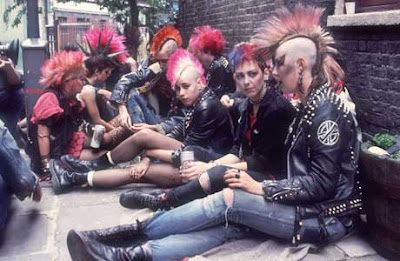Sometimes I wonder where writing fads come from…and then I look at the bestseller lists and go, oh yeah. All the people writing vampire books are looking at the Twilight series and the success of the Sookie Stackhouse novels and saying, I want a piece of that. And it’s tough to blame ’em for wanting a slice of bestselling pie. (If I’m fortunate enough to be served up a plate, I won’t say no; I’ll ask for whipped cream.)
But here’s the problem with writing according to fads or the market: what’s popular now won’t necessarily be popular a year or two from now, which is what you have to be thinking about if you’re trying to anticipate the market. It takes a year for a publisher to get a fiction book onto the shelves—ten months if they rush it, nine if nobody sleeps. And before that, you have to actually write the book and get an agent, and said agent has to get you your deal. (Unless you’re going to go the slush pile route, in which case you can add on another year to eternity.) So let’s keep the math simple and say for the sake of argument, if you’re trying to anticipate things, that you need to predict what editors will want to buy a year from now if you’re writing your book. They, in turn, are gambling that your book will be popular the year afterward. If you write something derivative of today’s market, thinking it’s hot, by the time somebody has to make a decision, they’ll be looking at your book like the hundredth peanut butter and jelly sandwich they’ve had in as many days. They’re not going to be excited.
And so you must look at what’s out there in the genre you wish to write—market awareness is good—and then write something new enough to stand out. Then, more importantly, decide if what you’re writing is something you’d actually want to read. If you read a lot (an excellent idea), then you will pick up on the tropes of a certain genre and maybe, after a while, figure out what’s missing. And if you want to read what’s missing and write what’s missing, then you might have landed on top of a Great Idea.
I don’t think I’m a brilliant market analyst, but back in 2008 I noticed something missing from the urban fantasy market: dudes. Not only dudes as protagonists, but dudes as writers. There weren’t many of either. The market was dominated by women writing about women, and the men in such tales were primarily romantic interests (all of which is fine, but as a reader dude I wanted more broken bones and fewer broken hearts). So I thought, hey, maybe there’s an opportunity here. Would I like writing urban fantasy? I’d never tried it. But there was this webcomic idea I was working on, tremendously fun for me to imagine and write but extremely difficult to illustrate, that perhaps could be adapted…so I started toying with it. And once I found a groove, the writing went extremely fast—and that was before I added Mountain Dew.
“I’m a dude! I’m writing about a dude! This is great! Mwah-ha-ha-ha!” It was kind of like that, except twice as nerdy as you’re imagining. But it wasn’t simply reveling in my dudehood: I was also steering away from vampires, werewolves, demons, half-faeries and half anything for my main character. The shelves were already full of those. They’re good stories—I devour them!—but the authors writing them were well established and I didn’t have anything new to say there. My webcomic, though, was about a Druid. A quick check of the shelves at Borders and Barnes & Noble revealed that there were zero urban fantasies featuring a Druid in the title role. Heck, I couldn’t find a Druid in a supporting role. Morgan Llewelyn wrote a book called Druids in 1993, but that was about historical Druids, not urban ones. So there you go—I figured out the market was missing urban Druid dudes, and I really, really wanted to write about one.
There’s always a risk in doing something new, because if a story is too weird, agents and editors won’t know how to market it. But the risk in following a fad is that when your manuscript arrives on an agent’s or editor’s desk, it will be the twentieth gnarly vampire romance they’ve seen that day. Would you rather they say, “WTF?” or “Not another one”? I’ll take the WTF every time. (Which may come back to haunt me: I can see the reviews now.) But I got lucky: I found an agent who liked my Druid, and then my agent found a good number of editors who liked him, too—enough that I got the insane luxury of choosing my (extremely awesome) publisher, Del Rey.
Part of what’s exciting about urban fantasy is that there’s SO MUCH room for new ideas and twists—so the preponderance of the same few creatures appearing over and over is puzzling. I’m waiting for the story about the short supermarket clerk—often mistaken for a dwarf—who doesn’t realize he’s half gnome, and the emerald ring from his unknown father gives him complete control over cats if he wears it on his index finger…or something. Gnomes are always background critters, but they’re begging to be fleshed out as a species. Somebody needs to write a gnome character I can care about. And what if trolls are only stupid and violent because of their militant political leadership and a poor education system? A visionary troll—self-taught through the Internet(s)—could arise and transform her culture if only she can survive the malignant attentions of the entrenched Club and Loincloth merchants who would keep them all lurking under bridges forever. Heh! You get the idea. My unsolicited advice is to always write what you like—but try to like something fresh in hopes that the market will be ready for it.



